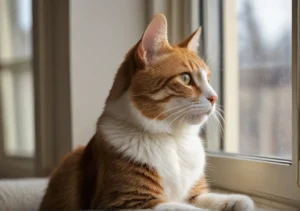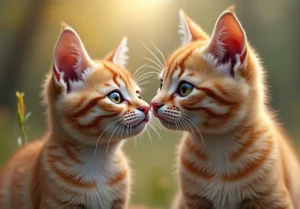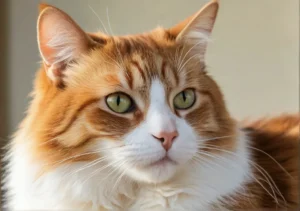Cats are known for their mysterious and sometimes quirky behaviors. One common feline behavior that often leaves pet owners puzzled is the act of making sounds at birds. Whether it’s a chirp, chatter, or chitter, many cats can’t resist vocalizing when they spot a feathered friend outside the window. But why do cats make these sounds at birds?
Cats make sounds at birds as a form of communication and expression.
Instinctual Behavior
Cats have a natural instinct to hunt, and their vocalizations towards birds are often a result of this predatory behavior. When cats see birds, their innate hunting instincts kick in, causing them to make sounds like chattering, meowing, or chirping. These vocalizations mimic the sounds cats make when they are stalking prey, showing their excitement and anticipation. It’s important to understand that this behavior is deeply ingrained in their nature, dating back to their ancestral roots as hunters in the wild.
Territory Marking
Another reason why cats make sounds at birds is to establish their territory and ward off potential intruders. By vocalizing towards birds, cats are marking their territory and sending a clear message to other animals that this area belongs to them. This behavior is a form of communication that helps cats defend their territory and assert their dominance.
- Cats may also vocalize at birds to attract the attention of other cats in the area, signaling their presence and reinforcing their territorial boundaries.
- It’s fascinating to note that some cats may use different sounds to communicate with birds compared to other cats, showcasing their complex communication skills.
For more information on understanding cat behavior, you can check out this helpful resource from the American Society for the Prevention of Cruelty to Animals: Understanding Cat Behavior
Playful Nature
Cats making sounds at birds can often be attributed to their playful nature. Cats are natural hunters, and when they see birds outside, they might vocalize as a way to express their excitement. It’s like a form of entertainment for them, watching the birds and trying to interact with them from a safe distance. This behavior is common among house cats who might not have the opportunity to hunt real prey, so chirping or meowing at birds can fulfill their hunting instincts in a playful manner.
Another aspect of this behavior is that cats are curious creatures, always interested in observing their surroundings. Birds are fascinating to cats because of their size, speed, and ability to fly. Making sounds at birds could be their way of trying to communicate or establish a connection with these creatures that capture their attention. It’s their version of interacting with the outside world from the safety of their home.
Hunting Practice
When cats make sounds at birds, it can also serve as hunting practice. Even indoor cats who don’t have the opportunity to hunt for real can benefit from this kind of simulated hunting experience. By stalking and vocalizing at birds through windows or doors, cats can sharpen their hunting skills, including focus, agility, and timing. This activity allows them to practice their predatory behaviors without causing harm to actual wildlife.
Additionally, the sounds cats make at birds may be a way for them to communicate their hunting prowess to other cats or animals in the household. By vocalizing their interest in birds, they could be signaling their readiness to pounce or playing out scenarios in their minds. This behavior is instinctual for cats and helps them maintain their hunting skills even in a domestic environment.
Additional Unique Insight:
Cats making sounds at birds can also be a way for them to release pent-up energy or frustration. Just like humans might verbalize their emotions, cats could be expressing their excitement or even their annoyance at not being able to physically engage with the birds they see outside. This vocalization can be a physical outlet for their emotions and a way to release any built-up tension.
Social Interaction
Cats making sounds at birds can be a way for them to engage in social interaction, even if the bird is outside and out of reach. Cats are naturally curious and social creatures, and they may vocalize at birds as a form of communication or play. This behavior can stem from their instincts as predators, as they try to mimic the sounds they would make when hunting. By vocalizing at birds, cats could be exhibiting territorial behavior, asserting their presence even from a distance. Additionally, the sight and sounds of birds may trigger a cat’s hunting instincts, prompting them to vocalize in response.
Curiosity and Stimulation
Cats are innately curious animals, and the sight of birds can pique their interest and provide mental stimulation. When cats vocalize at birds, it may be a way for them to express their excitement and engage their brains. This behavior can also be a form of entertainment for cats, as they watch and vocalize at the birds from afar. The sounds made by the birds could intrigue the cat, prompting them to respond vocally. It’s a way for cats to stay mentally active and engaged, even if they can’t physically interact with the birds.
Additional Insight: Environmental Enrichment
Providing your cat with opportunities to observe birds can serve as a form of environmental enrichment. Setting up a bird feeder near a window can give your cat visual stimulation and a chance to engage in natural behaviors like vocalizing at birds. This can help prevent boredom and provide mental stimulation for your feline friend.
Remember to always ensure the safety of both your cat and the birds when creating environments for observation and interaction. Consider using window screens or mesh barriers to prevent any unwanted physical contact between your cat and the birds.
Safety Precautions
Indoor cats often find entertainment in watching and vocalizing at birds outside. To ensure your feline friend’s safety during these interactions, consider installing sturdy screens on windows and balconies to prevent any accidental escapes. Additionally, providing plenty of stimulating toys and activities indoors can help satisfy your cat’s natural hunting instincts without the need for outdoor encounters with birds. Remember, safety first when it comes to your curious kitty’s bird-watching adventures!
Interesting Fact: Ancient Origins
Did you know that in ancient Egypt, cats were revered for their hunting prowess and ability to protect grain stores from pests like birds? Archaeological findings suggest that cats were often depicted alongside birds in hieroglyphics, showcasing their important role in Egyptian society. This historical connection between cats and birds sheds light on the longstanding fascination that felines have had with these feathered creatures.
By understanding the reasons behind why cats make sounds at birds, pet owners can gain a deeper appreciation for their feline companions’ behaviors and provide enriching experiences for their beloved pets.
Alex, a passionate animal lover, has experience in training and understanding animal behavior. As a proud pet parent to two dogs and three cats, he founded AnimalReport.net to share insights from animal experts and expand his knowledge of the animal kingdom.




